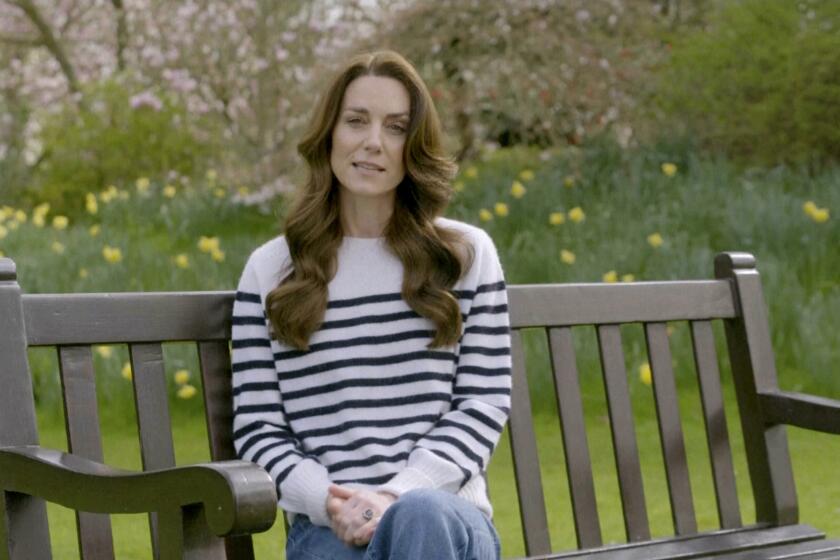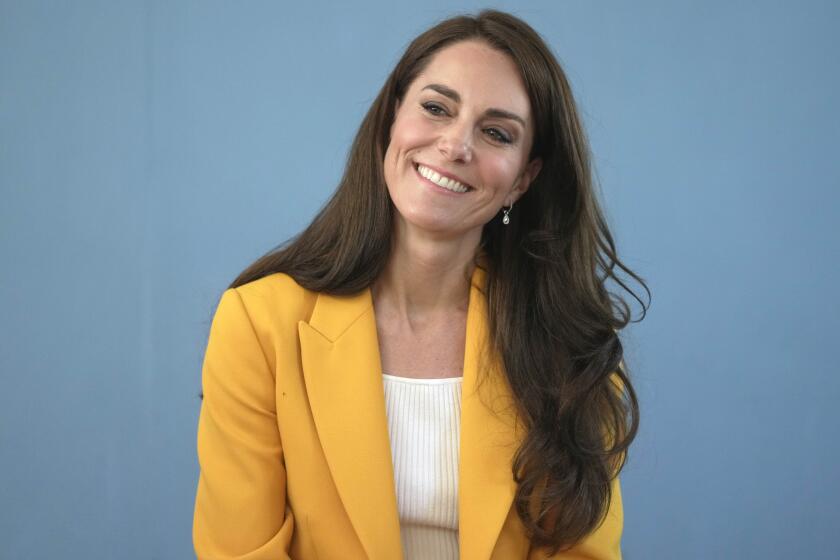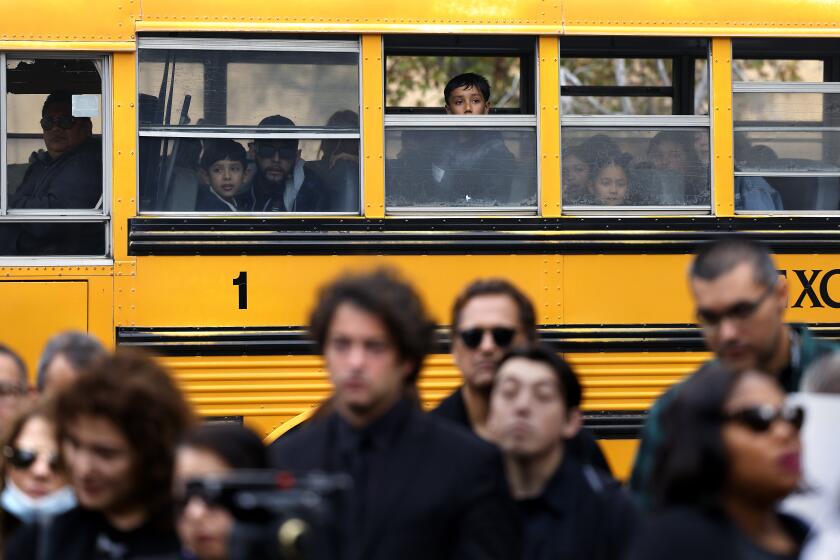Kate Middleton is helping her kids through cancer diagnosis. How to talk to your children

When Kate Middleton announced her recent cancer diagnosis, she emphasized the time she and her husband, William, Prince of Wales, took to share the news with their three children.
Talking to pre-adolescent children about serious illnesses is the right course of action for any family because children can sense change, said Kathleen Ingman, a pediatric psychologist at the Cancer and Blood Institute at Children’s Hospital Los Angeles.
“Keeping information from them, even from young children, can often lead to anxiety because they know something is happening but don’t know what it is,” Ingman said.
In a video announcement, the Princess of Wales said that the undisclosed form of cancer was detected after she underwent a “major abdominal surgery” in London at the beginning of the year. She is currently undergoing chemotherapy.
The 42-year-old said it’s taken time to recover from surgery, undergo treatment, and explain her medical situation to her three children — Princes George, 10, and Louis, 5, and Princess Charlotte, 8 — “in a way that’s appropriate for them and to reassure them that I’m going to be OK.”
Catherine, Princess of Wales, has an undisclosed form of cancer. She announced the news online after months of speculation about her health and whereabouts.
Ingman and Lauren Schneider, clinical director of child and adolescent programs for grief support center Our House, spoke to The Times about how to talk to young children about serious illness and its effect on the whole family.
As their first piece of advice, they encourage families to make kids a part of the discussion right away because children are very sensitive to minute changes in their environment, Schneider said.
“It prevents [the information] from growing into a big piece of news that then feels like a scary thing to drop all at once after a delay,” Ingman said.
A lack of information can also lead the child to be fearful, she said, or their imagination might “take them places that might end up being worse than what the actual truth is.”
The first of many conversations about a serious illness
Talking about a serious illness with a child is unique to each family and medical situation.
Experts say the conversation can start around a child’s observation of the situation — for example, if a parent or another adult in their life has been going to see the doctor more than usual, or if the person has been noticeably sick.
Begin the conversation with what they know by asking such things as, “Remember when this happened?” or “Did you notice this person wasn’t feeling well?”
Many will shame royal watchers for speculating about the Princess of Wales’ health. But catastrophic missteps by the royal communications apparatus created this mess.
After the child responds with their observation, the adult can then go into explaining what’s happening. (More on how to do that below.)
This is also a good time to reassure the child that what is happening is not their fault, Schneider said.
“Small children are very egocentric, they usually experience emotions that their parents have as having something to do with them,” she said.
Parents should understand that one conversation about the situation won’t suffice.
The child will let you know when they’re ready for more information. Experts say that when children ask questions spontaneously, later in the day or on another day, that means they’re ready to hear more.
Young children tend to ask the same question over and over, which tells the adult they want to learn more about the situation, Ingman said. This is a good framework for giving information incrementally through a series of conversations.
“It just helps reassure them that the adults in their life are trustworthy,” Ingman said, because the adults are informing them.
If a child doesn’t ask questions, the parent or guardian should check in with them or offer another trusted adult who’s available to talk.
The revelation that the princess has cancer went alongside a request for “some time, space and privacy while I complete my treatment.”
During the conversation
It’s OK to be open and honest about what’s happening and how it can affect the entire family.
Part of that honesty includes using actual medical terms like cancer or chemotherapy. Ingman said the terms are scarier to adults than to children because kids don’t have a grasp of their meaning yet.
It’s an opportunity to explain the terms to them so they are prepared for how the illness will affect their loved one. Using a term also demystifies it and gets them comfortable hearing it.
Experts discourage guardians from using euphemisms or vague statements like “Mom is sick,” because it could confuse the child.
For example, if a child’s family member died from complications of a serious but unspecified illness, they might think another person with an unspecified illness could have the same outcome.
Michael Strahan commended his teen daughter Isabella for staying strong as she undergoes chemotherapy for her rare brain cancer. ‘She’s been fighting through it,’ he said.
“It’s actually scarier for kids to hear ‘sick’ because then they’re going to hear other people are ‘sick’ and they’re going to think that those people are going to die,” Schneider said.
By using the right terms, the parent can talk about how treatment is different for everyone or how an early diagnosis can be different from a late one.
For young children, the first explanation will be short and simple.
Pay attention to how the child is responding to the conversation, Ingman said. They might be emotional if it’s very difficult news, and that’s normal. There’s no formula for how to conduct this conversation and no guarantees about how it will go, so it’s customary to take breaks and to allow time for follow-up questions.
A part of the conversation is how the illness will affect the whole family, which includes telling the child how this might change their routine.
Let the child know if a different family member will pick them up from school, or if a relative will stay with them at night should the adult need to go to the hospital. Telling them about these changes but working to keep as much of their routine going is reassuring to them, Ingman said.
It’s hard not to feel some guilt about indulging in wacky theories about Kate Middleton’s absence from the public when the truth — cancer — was more devastating than we imagined.
Signs of distress
A child’s reactions to this conversation can run the gamut because each child is unique. It’s normal for a child to not react, just as it’s normal to be very distressed.
It becomes a concern when the child has prolonged signs of distress that don’t go away. These include getting worse grades at school, being withdrawn or not being able to engage in activities the child typically enjoyed.
Other signs, Schneider said, include not wanting to be separated from the adult who’s sick, not sleeping independently or not wanting to go to school.
In this scenario, Schneider advises guardians to ask the child what’s causing them to act this way, what’s worrying them or what’s bothering them, because the adult and child can then talk about it.
“Their behavior is their way of showing their pain, and that’s something that parents need to remember because [children] can’t come right out and say it,” she said.
Children born from 2010 to 2024 are part of “Generation Alpha,” the demographic successor to Gen Z. They are already being called “feral,” illiterate” and “doomed,” with bad parenting by millennials and the influence of technology blamed for bad behaviors.
Get the child involved
Along with being brought into a conversation that’s appropriate for their age, children can also be given a hands-on role.
Ingman said giving the child tasks such as drawing a picture, taking a photo or writing a note for the ill family member gives them some sense of agency in the situation.
What happens if the illness becomes terminal
It’s extremely important that kids have an opportunity to prepare if a parent or sibling is not going to survive, because the family can collectively make choices about how to spend those final days and how to say goodbye, Schneider said.
“If they’re not given the information,” she said, “the fear of the unknown is much worse for them.”
More to Read
Start your day right
Sign up for Essential California for news, features and recommendations from the L.A. Times and beyond in your inbox six days a week.
You may occasionally receive promotional content from the Los Angeles Times.













